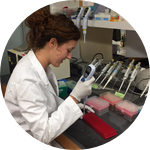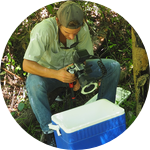Bees
Categories

As prolific pollinators, bees are essential for the success of countless plants, from crops on farm to the colorful flowers in our gardens, on every continent but Antarctica. However, they are also very sensitive to changes such as habitat loss, climate change, and pesticides.
The Projects
Browse the participating projects
Home sick: Effects of migratory beekeeping on honey bee disease
Crop pollination by migratory beekeeping operations presents a highly concentrated convergence of bees where...
Does insecticide exposure affect solitary bee nesting behavior?
Alfalfa leafcutter bees (ALBs) are important crop pollinators that nest in aboveground cavities (e.g. straws...
Are cities hostile environments for honey bees?
Pollinators are vital to the maintenance of life. They assist flowering plants (including most human food...
Hacked clocks tell us how an important pollinator keeps time in changing world.
The leafcutting bee plays a critical role in our society by pollinating wild and cultivated plants and supporting...
More About This Challenge
The sciency details
Challenge Aims
Bees are studied globally for their importance in pollination and food security, as indicators of their environments, and for some species' intelligent and social communities. Culturally, humans have been fascinated by honey and bees since ancient times, and beekeeping as a hobby and profession is practiced around the world.
Seven native Hawaiian bee species have recently been placed on the endangered species list, the first bees to be protected in the US. What factors are causing colony collapses? How are native species fairing? How is climate change affecting the processes and health of bees?
Any research project working on bees in any capacity is invited to submit to join the challenge! We are interested in learning more about the world of bees, and interdisciplinary projects are more than welcome. If you'd like to chat more about your idea, get in touch at support@experiment.com.
You can begin your project page and submit it using the button below. Submit by October 20th to join the challenge!
A few past successful bee-related Experiment campaigns:
Bee battles: are our native bees losing the fight for resources?
E pluribus unum: how honey bee bacteria coordinate behaviors
Project Eligilibity
Any project conducting research on bees is invited to participate. Please get in touch if you aren't sure about your idea, by emailing us at support@experiment.com. Interdisciplinary projects are more than welcome! Researchers must be based out of institutions or organizations in the US, UK, Australia, or Canada.




 Challenge Grants
Challenge Grants